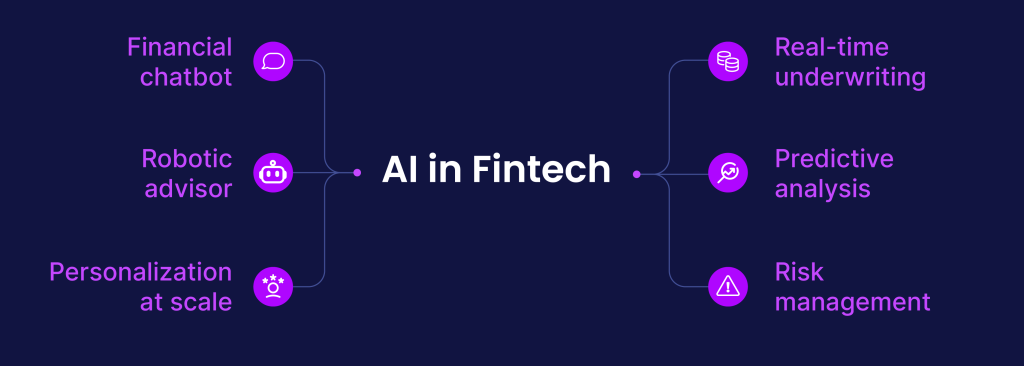6 Best Use Cases of AI In Fintech
Finance
6 Best Use Cases of AI In Fintech
The financial sector has traditionally been prudent in adopting new technologies because of the constant need to closely evaluate risks. But with the proliferation of AI and big data, things are changing, and they’re changing fast.
When it first rose to prominence in the 1990s, Fintech was usually limited to the back-end software of financial institutions. However, since banks went online, Fintech took off and has since been evolving at a fast pace, showing no signs of slowing down. With an increasingly cashless economy, user-centric apps and platforms are designed to help customers better understand and manage their finances.
Then comes AI, the game-changer technology that is rewiring how machines interpret and engage with various data inputs. The equation of AI and Fintech is a multi-layered one that stands at the very core of financial digital transformation and produces leading-edge innovations.
AI in Fintech
AI is a data-hungry system that feeds its algorithms meaningful insights to generate accurate predictions and automate complex tasks. Given the data-heavy nature of financial institutions, AI fits it perfectly, like a glove. The large amount of data produced every day by financial institutions serves as a deep funnel for AI to predict trends, automate customer support, optimize investment strategies, identify potential risks and fraudulent activities, and enhance engagement experiences.
But it doesn’t stop there. AI also assumes the role of data quality enhancer for financial institutions. It helps set the stage for data processing through automated profiling, cleansing, validation, duplicate removal, anomaly detection, and real-time monitoring.

How is AI used in Fintech?
1. Chatbots and virtual assistants
Primarily focused on customer service and communication, chatbots and virtual assistants use Natural Language Processing (NLP) to understand and respond to customer queries, offer basic information (account balances, transaction history), and help solve simple tasks (password reset, transaction tracking).
They are proving to be highly efficient and accurate in most scenarios. Take, for example, Bank of America’s virtual assistant, Erica. Since its launch, it has handled over 1 billion customer requests, with more than 98% of clients getting the answers they were seeking.
2. Robotic advisors
Providing automated, algorithm-driven financial planning and investment services, robotic advisors collect user information (financial goals, risk tolerance) and use this data to create and manage investment portfolios at a fraction of the cost of traditional financial advisors.
According to Statista, the global Robo-Advisors market is projected to grow by 6.68% (2024-2028).
3. Deep understanding of customer behavior
In Fintech, AI’s ability to analyze vast amounts of customer data, from transactions and browsing history to social media activity, reveals valuable patterns and correlations. The deep understanding of customer preferences, financial habits, and risk profiles puts financial institutions on the right path to making informed decisions and offering tailored services.
Also, AI’s predictive modeling capabilities enable financial institutions to anticipate future customer behavior. They can proactively engage customers and suggest timely solutions by forecasting potential churn and customer dissatisfaction or identifying opportunities for new product adoption.
AI’s real-time analysis of customer interactions lays the groundwork for personalized experiences. By understanding the customer’s current context and needs, financial institutions can provide personalized recommendations and enhance the overall user experience along the way.
4. Relevant loyalty offering
Fintech companies are redefining customer loyalty and reward programs by utilizing AI to analyze individual preferences and behaviors. This allows them to tailor offers and rewards uniquely relevant to each customer, increasing engagement and satisfaction, promoting long-term loyalty, and driving repeat business.
5. Credit scoring and loan underwriting
AI helps lenders make more accurate credit decisions by analyzing non-traditional data sources (such as social behavior, payment history, and digital footprints). This broadens access to loans for individuals and businesses with limited credit histories, especially in emerging markets.
With real-time underwriting, AI models can assess risk and make underwriting decisions quickly, reducing approval times for loans and credit products.
6. Risk management and predictive analysis
AI assists financial institutions in assessing market risks and portfolio management by examining many data sources to predict trends and potential risks. Predictive analytics helps in making informed decisions about investment strategies, financial planning, market volatility, and hedging against potential risks.
Wrapping up
Due to the highly competitive nature of the software industry, time is always held in high regard, and rightfully so. But this often results in the compromise of the most crucial process of all – QA testing. So, practically everyone in the product development community is susceptible to erroneous accidents. Let this outage be a wake-up call that thorough testing is not a luxury but a necessity in ensuring software reliability and security, reinforcing the need for the industry to prioritize quality alongside speed.




